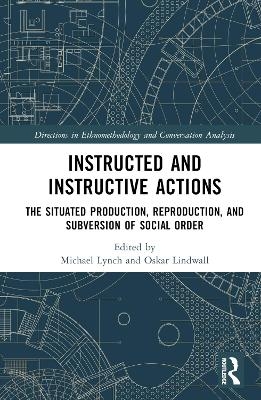
Instructed and Instructive Actions
Routledge (Verlag)
978-1-032-23071-9 (ISBN)
The contributors to this volume take up the theme of instructed and instructive actions. Harold Garfinkel, the founder of ethnomethodology, initiated the study of instructed actions as a way to elucidate the embodied production of social order in real time. Studies of instructions and the actions of following them provide empirical content to the classical theoretical issue of how rules, norms, and other normative guidelines are conveyed, understood, and used for producing social actions and structures.
The studies in this volume address novel technologies of instructed action and non-obvious ways in which ordinary actions turn out to be instructive for participants in immediate situations of action and interaction. In some cases, the studies address specialized practical, artistic, and recreational activities, and in others they address commonplace modes of action and interaction. In all cases, they focus on how the manifest organization of specific activities is organized with and without explicitly formulated instructions.
This book will appeal to scholars across the social sciences with interests in ethnomethodological approaches to research by contributing to understandings of how specific actions are instructed and instructive in the circumstances in which they are produced.
Chapter 2 of this book is freely available as a downloadable Open Access PDF at http://www.taylorfrancis.com under a Creative Commons [Attribution-Non Commercial-No Derivatives (CC-BY-NC-ND)] 4.0 license.
Michael Lynch is Emeritus Professor of Science & Technology Studies at Cornell University, USA and part-time Research Professor in the School of Media and Information, University of Siegen, Germany. He received his PhD in Social Sciences at the University of California, Irvine, in 1979 and has held positions in Sociology, Human Sciences, and Science & Technology Studies at Whitman College, Boston University, Brunel University, and Cornell University. His major fields are ethnomethodology and social studies of science. He has investigated practical action, visual representation, and discursive interaction in scientific and legal settings and has written extensively about conceptual and analytical issues in the social sciences. He was Editor of Social Studies of Science from 2002 until 2012 and was President of the Society for Social Studies of Science from 2007 to 2009. Oskar Lindwall is Professor in Communication at the Department of Applied IT at the University of Gothenburg, Sweden. Before that, he held a position in Education at the same university and he received PhD at the Department of Communication Studies at Linköping University. His major fields are ethnomethodology, conversation analysis, and the learning sciences. He has been the principal investigator in projects investigating dentist education, YouTube tutorials, surgical training, and feedback in higher education. He has also conducted research on lab work in science education, architect education, simulation training in medicine and maritime education, and the teaching and learning of craft. He was the President of the International Society of the Learning Sciences from 2021 to 2022.
Foreword: A Brief ‘Backstory’ to Instructed Action Introduction: Instructed and Instructive Actions Part One: Foundational Issues 1. Praxeological Validity of Instructed Action 2. Detail, Granularity, and Laic Analysis in Instructional Demonstrations Part Two: Situated Action and Order Production 3. Phenomenal Fields Forever: Instructed Action and Perception’s Work 4. Joining the Queue as a Newcomer: The Instructably Visible Order of Queuing 5. Rules as Instructed Actions: The Case of the Surfers’ Lineup 6. The Use of Everyday Maxims and Proverbs in At-Sea Sailing Instruction Part Three: Instructively Reproducing Artful Activities 7. Artworks as Instructed Objects. An Ethnomethodological Approach to Artists’ Instructions 8. Ways of the Brush in Japanese Calligraphy Art Lessons 9. Performative Teaching and Learning: On the Instruct-ability of Kin/aesthetic Properties 10. Spirituality and Internal Movement as Embodied Work in Yoga and Taiji Practice Part Four: Improvisations and Subversions 11. Bricolage in Astronautics: Talk-in-Interaction in the Construction of Apollo 13’s DIY CO2 Scrubber 12. When Someone Walks Apart: Instructed Action and its Fragilities 13. Protocol Subversion: Staging and Stalking "Machine Intelligence" at School Afterword: Instructed Action as Wayfinding
| Erscheinungsdatum | 12.12.2023 |
|---|---|
| Reihe/Serie | Directions in Ethnomethodology and Conversation Analysis |
| Zusatzinfo | 1 Tables, black and white; 81 Halftones, black and white; 81 Illustrations, black and white |
| Verlagsort | London |
| Sprache | englisch |
| Maße | 156 x 234 mm |
| Gewicht | 453 g |
| Themenwelt | Geisteswissenschaften ► Psychologie ► Allgemeine Psychologie |
| Geisteswissenschaften ► Psychologie ► Sozialpsychologie | |
| Geisteswissenschaften ► Psychologie ► Verhaltenstherapie | |
| Sozialwissenschaften ► Soziologie | |
| ISBN-10 | 1-032-23071-1 / 1032230711 |
| ISBN-13 | 978-1-032-23071-9 / 9781032230719 |
| Zustand | Neuware |
| Informationen gemäß Produktsicherheitsverordnung (GPSR) | |
| Haben Sie eine Frage zum Produkt? |
aus dem Bereich


